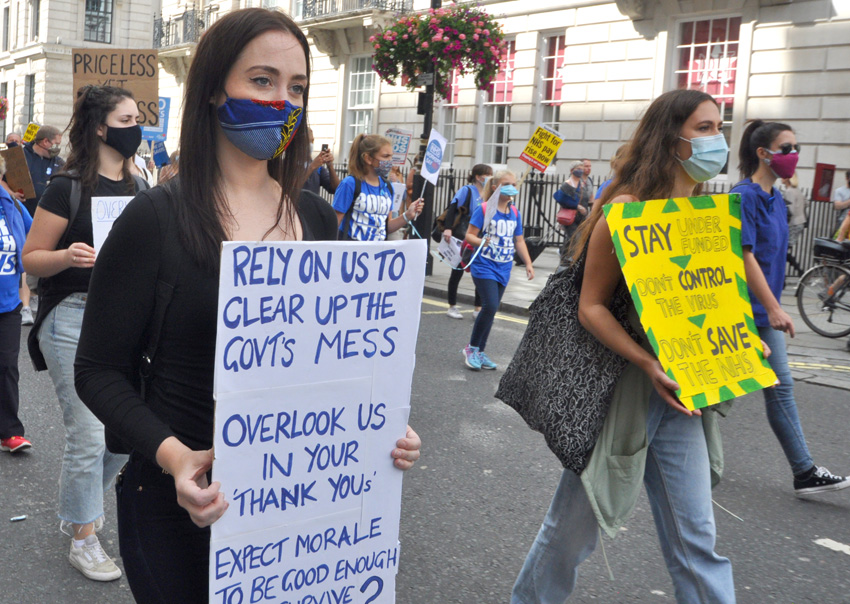REPEATED catastrophic failures at an NHS trust meant that more than 200 babies may have died and that many others were left with life-changing injuries, a report has said.
In all, the report’s author Senior Midwife Donna Ockenden identified 60 specific improvements that could be made at Shrewsbury and Telford NHS Trust (SaTH) and said there could be ‘no excuses’ going forward.
The review found a culture of not investigating mistakes, with hundreds of instances where SaTH failed to appropriately examine deaths or undertake serious incident investigations with mistakes being ‘inappropriately downgraded’.
The Ockenden review examined maternity care at SaTH spanning 20 years.
Between 2011 and 2019, 40% of stillbirths and 43% of neonatal deaths did not even have an investigation. Of those cases that were examined, the Ockenden team graded the reviews as poor in almost half of stillbirths and over a third of neonatal cases.
Her report found babies’ deaths not being investigated meant ‘failures in care were repeated’.
It also found bereaved parents were not listened to when they raised concerns.
The RCM trade union, responding to the Ockenden review into maternity services at Shrewsbury and Telford, said that ‘Poor culture and leadership must be addressed if we are to make our maternity services the safest place to give birth.’
The RCM said: ‘Today, the RCM has pledged to continue its work to be part of the solution to safety improvements and support its members to do the same not only at Shrewsbury and Telford NHS Trust, but throughout all maternity services across the UK.’
SaTH has apologised to affected families and described the report as ‘deeply distressing’.
Kayleigh Griffiths, whose daughter Pippa died in 2016, said words from the trust ‘aren’t going to be enough’.
The review, which examined almost 1,600 cases, is thought to be largest of its kind in NHS history.
It revealed 201 babies could have survived had SaTH provided better care, related to 70 neonatal deaths and 131 cases where babies were stillborn.
There were also 29 cases where babies suffered severe brain injuries and 65 incidents of cerebral palsy.
Rhiannon Davies, whose daughter Kate died in 2009, said the numbers themselves did ‘not not tell the whole story’ of the impact on families.
Ockenden said: ‘We now know that this is a trust that failed to investigate, failed to learn and failed to improve.
‘This resulted in tragedies and life-changing incidents for so many of our families.’
In all the cases identified by the inquiry, as well as nine mothers’ deaths, it found better care ‘might’ or ‘would reasonably be expected’ to have made a difference.
Ockenden cited examples of ineffective monitoring of foetal growth and a culture of reluctance to perform Caesarean sections as repeated problems which ‘resulted in many babies dying during birth or shortly after’.
‘The reasons for these failures are clear,’ she said. ‘There were not enough staff, there was a lack of ongoing training, there was a lack of effective investigation and governance at the trust and a culture of not listening to the families involved.’
- A culture where mistakes were not investigated and a failure of external scrutiny
- Parents were not listened to when they raised concerns about the care they received
- Where cases were examined, responses were described as lacking ‘transparency and honesty’
- The trust failed to learn from its mistakes, leading to repeated and almost identical failures
- A culture of bullying, anxiety and fear of speaking out among staff at the trust ‘that persisted to the current time’
- Caesarean sections were discouraged, often leading to poor outcomes.
Commenting, the Royal College of Midwives’ (RCM) Chief Executive Gill Walton said: ‘It is heartbreaking that this report only came about because of the determination of the families.
‘We owe them a debt that I fear can never be repaid. This review must be a turning point for all those working in maternity services.
‘The actions recommended are measured and sensible and reflect much of what the RCM has been calling for.
‘We hope that those in a position to enact them – NHS England and the Department for Health & Social Care – will do so in partnership with organisations like ours and with haste.’
Walton added: ‘I am asking midwives, maternity support workers, obstetricians and anyone working in maternity services to look around them and ask themselves: is the care being provided where you work safe?
‘If it’s not, I need you to have the courage to speak up, raise your voice and stand up for higher standards. Poor working cultures lead to a lack of timely and appropriate escalation, which in turn compromises safety. This has to stop.’
